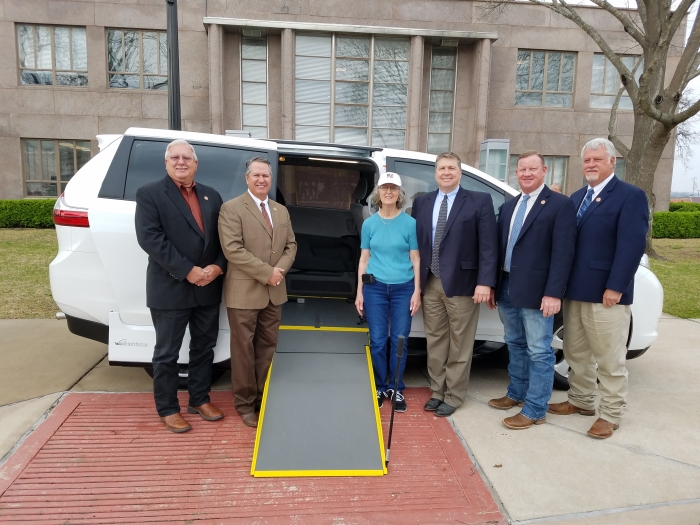Commissioners split tax note, welcome new VetRide van

Lew K. Cohn/The Highlander
Following the Feb. 28 meeting of the Burnet County Commissioners Court, members viewed a new VetRide van provided by an anonymous donor. Gathered around the handicap accessible ramp of the van, from left, are Russell Graeter of Precinct 2, Joe Don Dockery of Precinct 4, VetRide Coordinator Sophie McCoy, Burnet County Judge James Oakley, Jim Luther Jr. of Precinct 1 and Billy Wall of Precinct 3.
By Lew K. Cohn
Managing Editor
The Highlander
Burnet County commissioners set a historic precedent last year by selling tax notes to raise money for special road improvements in the county. On Tuesday, Feb. 28, commissioners voted how to distribute those funds, choosing a method which splits funds more closely in line with the taxable values of the four precincts, yet also allows for a little more equitable distribution of funds.
Last year, commissioners voted to approve issuance of $5.85 million in bonds to pay for road projects outside the normal scope of the work they do, based on estimates provided to the court by KC Engineering. Burnet County Judge James Oakley said the issuance of these bonds “doesn't affect the tax rate.
“This was a unique opportunity for us to float out our tax rate and to enhance some of this vintage infrastructure we have out there so our roads can be more passable, especially when we have one of our average rain events,” Oakley said.
After calculating fees, the county has $5,737,206 to be disbursed to the capital projects fund for each of the four commissioner precincts and Oakley presented three scenarios for distribution of the funds. The first called for an even split of the funds, with 25 percent going to each precinct, or $1,434,301.50. The second option called for distribution of tax notes in accordance with the taxable values of each precinct, which means Precinct 1 would get the most at $2,036,708 or 35.5 percent of the total amount, while Precinct 2 would only get $791,734, or 13.8 percent. Precinct 4 would get $1,193,338 or 20.8 percent, while Precinct 4 would get $1,715,424, or 29.9 percent.
Oakley cited Section 252.108 of the Texas Transportation Code, which deals with use of county road and bridge funds, as his reasoning for distributing funds according to taxable value under Option 2. That section states “As nearly as the condition and necessity of the roads permit, the fund shall be spent in each county commissioner's precinct in proportion to the amount of money in the fund collected in the precinct.”
Noting the vast disparity in funds, however, Oakley proposed a third option that would average the amount the two options would generate, bringing some parity back to the process while also preserving a distribution based on taxable values.
Under Option 3, Precinct 1 will still get the most money at 1,735,504.75, which is 30.2 percent. Precinct 4 will get 27.5 percent or $1,574,826.75. Precinct 3 will get 22.9 percent or $1,313,819.75, while Precinct 2 will get 19.4 percent or $1,113,017.75.
Precinct 1 Commissioner Jim Luther, Precinct 3 Commissioner Billy Wall and Precinct 4 Commissioner Joe Don Dockery all expressed their support for Option 3 as being fair, while Precinct 2 Commissioner Russell Graeter expressed his opinion that the county had always broken down funds for roads and bridges equally in the past.
“I would have hoped everyone would agree with equally distributing the funds,” Graeter said. “If we choose Option 2, I couldn't even get my main project done. I would personally vote for Option 1. I think we should spread the funds out equally.”
Ultimately, the court voted to adopt Option 3 as Dockery and Luther moved and seconded to do just that. Graeter reiterated his concerns, but voted along with his colleagues to support Option 3 and made it unanimous.
“We have set history in Burnet County,” Dockery said after the vote. “This is the first time we have ever had a tax rate issuance for road projects and it shows this court is willing to move to do what is necessary to improve our road and bridge systems.”
“We are definitely hitting another gear in the gear box when it comes to trying to deal with some of the growth we have experienced,” Oakley added. “We have a responsibility to address that growth by making sure our roads and bridges are in the best shape possible and tax issuances like this are going to help us handle that.”
The county has advertised for requests for qualifications for engineers on special road projects and will open bids at 2 p.m. Thursday, March 16. A committee of Wall, Dockery and Luther was established to review and score qualifications and a workshop will be posted in accordance with the Texas Open Meetings Act.
Following the meeting, commissioners took the opportunity to view the new VetRides van, paid for with an anonymous donation.
When VetRide was established in 2010, the projected number of rides for year one was 660, with 874 rides actually provided. It continues with an average of 325 phone calls a month and almost 100,000 miles driven in support of more than 150 individuals each year.
VetRide offers: no charge for service, vans that are wheelchair and scooter accessible, door to door pick up and drop off, caring drivers and volunteers who work diligently to create a friendly and comfortable environment for everyone, and opportunities to meet other veterans and establish new relationships and support systems.
In 2011, the VetRide program received the Texas Association of Counties’ Best Practices Award for Exceptional Service Delivery. The program was honored last year by the Legacy Fund with the Non-Profit Leader Award, highlighting the service of current coordinators of VetRide, Sophie McCoy and Burnet County Veterans Services Director Bill Worley.

